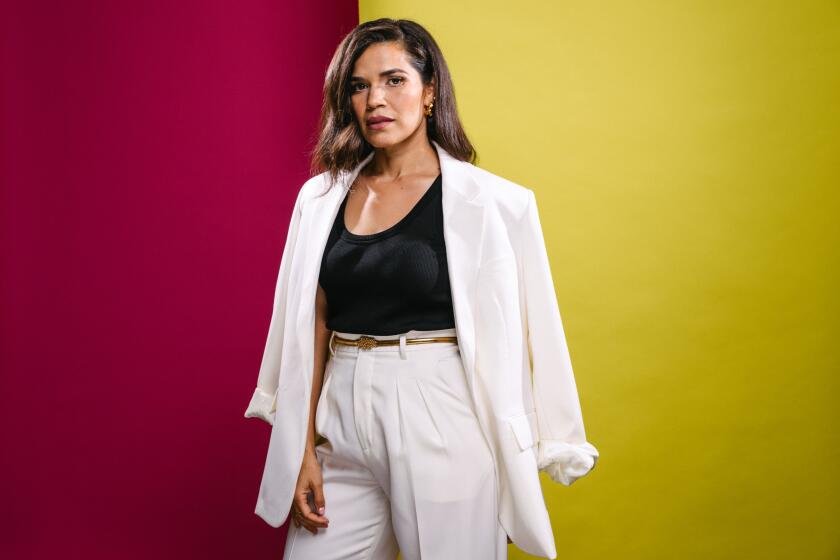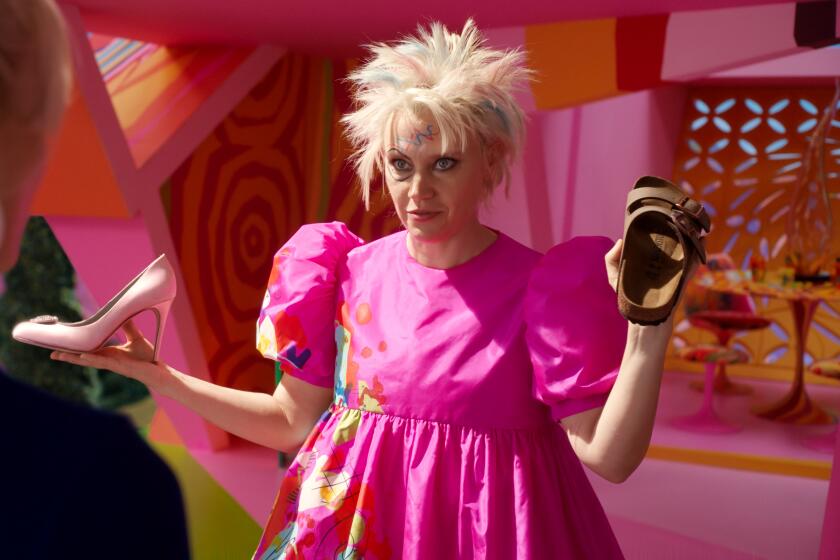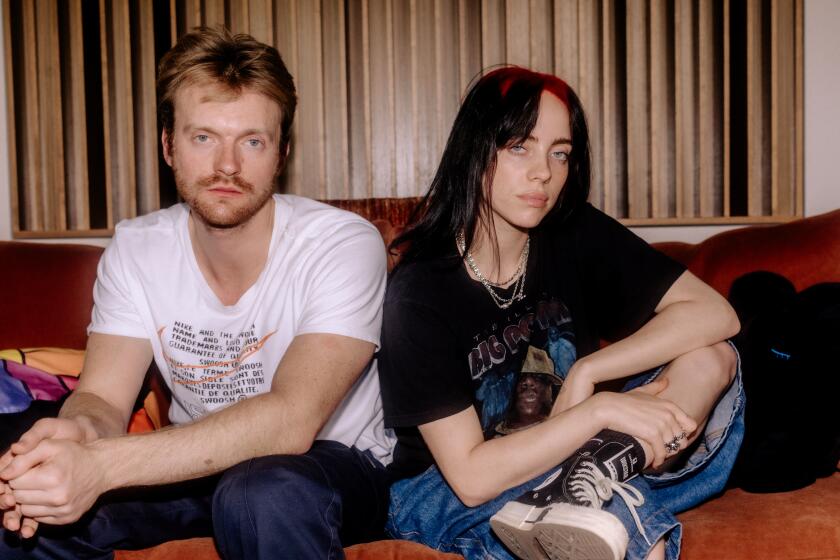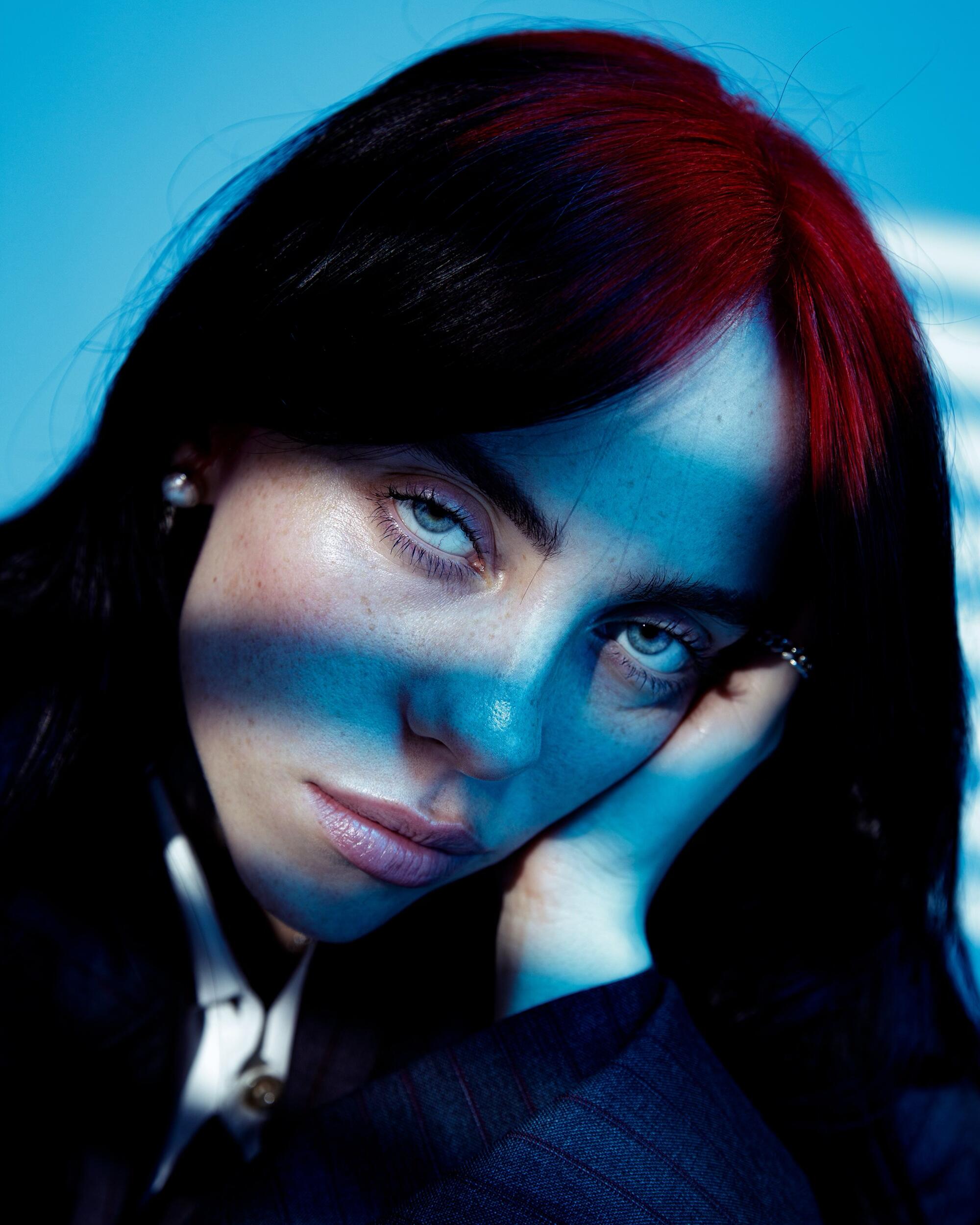
“This is kind of dark,” Billie Eilish says, “but recently I was reading Kurt Cobain’s suicide note.”
The 21-year-old pop superstar is snuggled on a sofa at a Los Angeles studio — black pants, black and red hair — and sets down the acai bowl in her hands to explain.
“It’s horrifying. I mean, all of it is the most tragic s— I’ve ever heard. He was such a pure person and talent,” she says of the late Nirvana frontman, “and I feel so much deep, deep, deep sorrow for him and his life and where it went. In the letter he’s like, ‘I have everything in the world, and I absolutely hate it.’ He was so ashamed that he wasn’t enjoying it.
“And I get why he was feeling that way,” she adds. “It’s just not what you think it’s going to be.”
Eilish didn’t wake up this morning burning with the desire to complain about being a world-famous celebrity, which is what she’s been since her 2019 debut, “When We All Fall Asleep, Where Do We Go?,” went quadruple-platinum and made her the youngest person in history to sweep the Grammy Awards’ four major categories in a single night. Even as someone hailed for bringing a welcome element of gloom to the bubbly Top 40, she knows that whining from a place of privilege can be a bad look.
But because I’ve asked her to, Eilish is describing the emotional circumstances that shaped her latest single, the bleakly gorgeous “What Was I Made For?,” in which she sings about having forgotten how to be happy over the saddest-sounding piano chords in the world. Cobain, who died in 1994, comes up as an artist she and her brother-producer, Finneas O’Connell, look to frequently for his understanding of the loneliness of success.
“It’s that existential-crisis vibe where you could be sitting in a room with people you love,” she says, “and you’re like, Oh, my God, what the f— is going on with my life?”
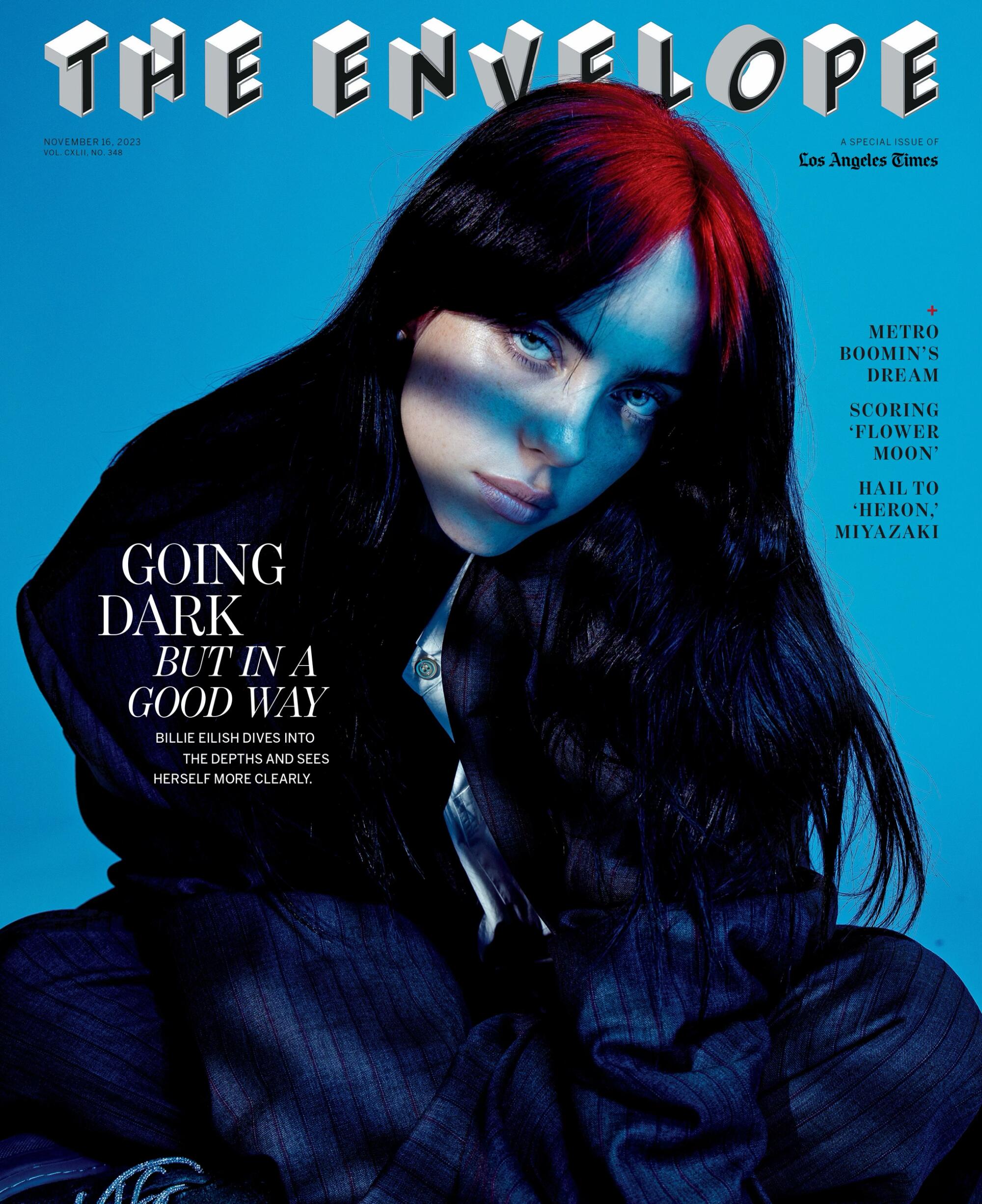
Should it come as a surprise that this ballad of a young woman’s disillusionment arrived as part of the Hollywood juggernaut that is “Barbie”? Greta Gerwig’s pretty-in-pink blockbuster is loaded with music, including streaming hits by Dua Lipa, Charli XCX and the duo of Nicki Minaj and Ice Spice. Most of the movie’s songs share its frothy spirit and sleek surfaces; yet “What Was I Made For?” is different: smaller, slower, infinitely more introspective.
Gerwig says she asked Eilish and O’Connell to write “Barbie’s heart song — the song that is deep inside her core that she doesn’t even completely know is there but that she starts to hear more clearly throughout the film.” The director recalls receiving the siblings’ demo, with just Eilish’s vocals and O’Connell on piano. “It totally wrecked me,” Gerwig says, adding that she immediately played it for her partner, Noah Baumbach, with whom she wrote the movie, and for others involved with the production. Their verdict? “We all cried.”
They’re hardly the only ones with whom the song has connected. A nine-week No. 1 smash on Billboard’s alternative music chart, “What Was I Made For?” has racked up more than half a billion streams on Spotify and YouTube and just earned five Grammy nominations including for record and song of the year. Now it’s in the running to compete for original song at the 96th Academy Awards in March.
Ferrera, who co-stars in ‘Barbie’ as Gloria, a lifelong admirer of the doll, delivers a rousing speech about womanhood in the film. Here’s how it came together.
“Turns out it got huge,” says Eilish, who won the original song Oscar in 2022 with “No Time to Die,” her and her brother’s sumptuous and melancholy theme from the James Bond film of the same title. Accepting the prize that night at the Dolby Theatre, the singer looked genuinely thrilled to have earned one of the highest honors in show business — “We promise not to lose these,” O’Connell joked as he hoisted his statuette — so today, not far from Dodger Stadium, I wonder what some other bright spots of pop stardom might be. Has she gone to a ballgame and had her face splashed on the giant video screens?
“Yes!” the L.A. native exclaims. “I loved it. That was literally my dream as a kid. Going to stuff like that is really cool when you’re famous, I gotta be honest.” She smiles. “Fame can be so horrendous, but there are parts of it that rock.”
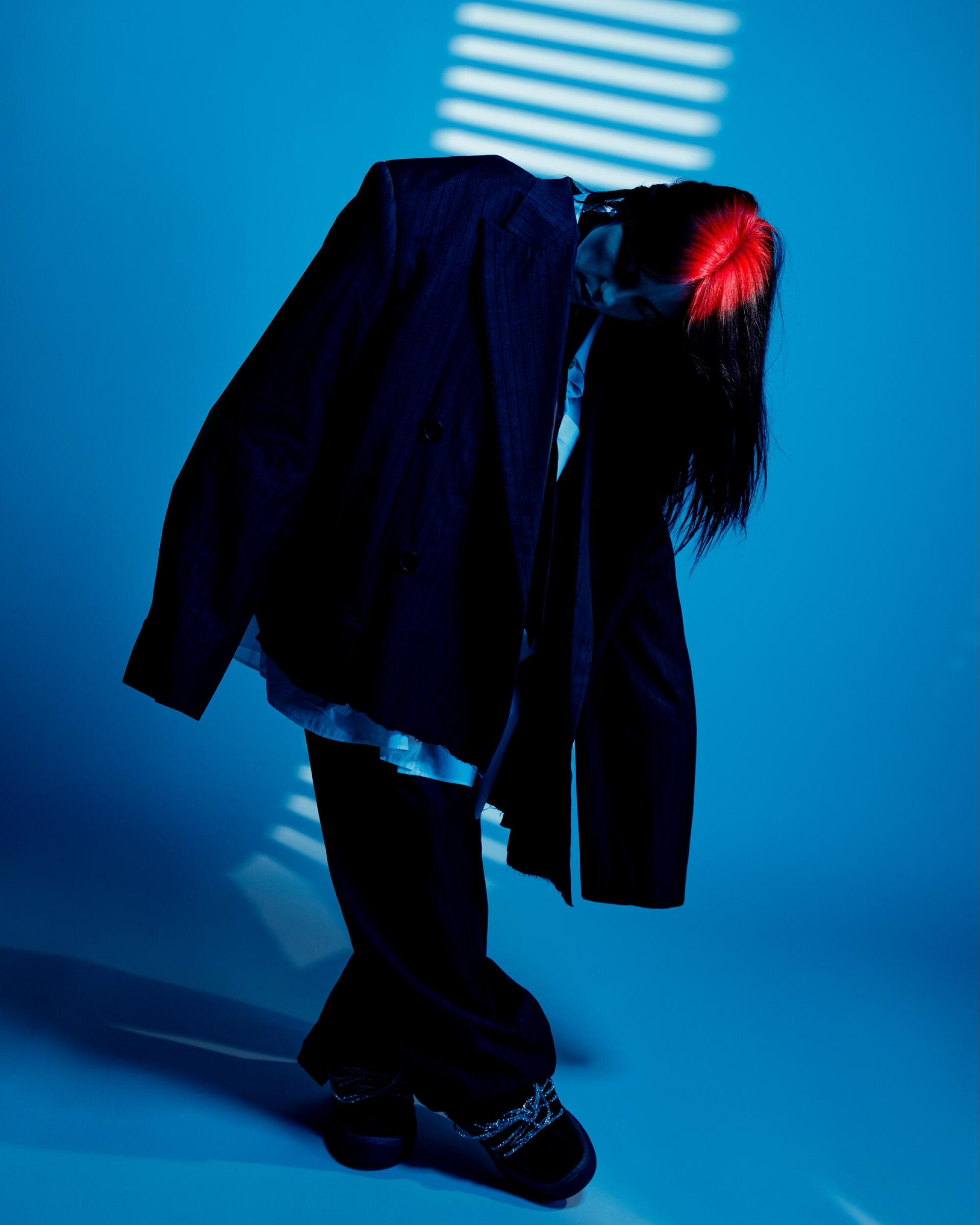
Eilish, who as a SAG-AFTRA member was barred from discussing “Barbie” on this day weeks before the actors’ strike was resolved, contends she didn’t have herself in mind when she wrote “What Was I Made For?” earlier this year. “I was thinking about a character from her point of view,” she says — Barbie, in other words, who over the course of Gerwig’s film comes to realize that perfection isn’t real (and that she wouldn’t want it even if it were).
Says Gerwig of the song: “It became a theme for Barbie’s whole awakening.”
“But then I was listening to it with a friend, and she was literally sitting there side-eyeing me — like, ‘Dude, this is your life,’” Eilish says with a laugh. What the singer can see now is that the external validation she received as a celebrated teenage phenom did a real number on her sense of self-worth after an adolescence marked by depression.
With help from Kate McKinnon, Greta Gerwig’s ‘Barbie’ pays homage to the doll we all played with too hard. So why not pay homage to my own?
“2019, that period of my life when I dyed my hair green, I was completely unstoppable,” she says. “I felt like I was on the moon. And I remember at the time being like, I’m finally happy. I’d never been happy before, and I just wanted to stay happy. Then a couple years happened. COVID happened. Another album happened,” she continues, referring to 2021’s “Happier Than Ever.” “I got older and fell back into being a human and not being happy all the time — having good moments and having bad moments. Last year got really bad. And I just kept being like, ‘God, I miss 2019 so much. When can my life feel like that again?’”
Through talks with her brother and her friends she eventually grasped that she’d been “basing all my happiness on all these things in the material world that you have no control over and that will inevitably change.” She shrugs. “This song has a lot to do with that. ‘I used to float’ — that’s what 2019 felt like,” she says, quoting the first line of “What Was I Made For?” before dropping the next one: “‘Now I just fall down.’”
Eilish thought she’d devised a plan for contentment by going blond-bombshell around “Happier Than Ever” — a dramatic shift from the edgy goth look that helped make her such a sensation. “At first it was fun,” she says, turning around to inspect her teeth in a mirror on the studio wall. “Hold on, there’s a seed stuck in here …” She dislodges the seed and goes on. “I was really excited for the blond era — like, Blond Billie is gonna be so cool. But it did not go how I wanted it to go.”
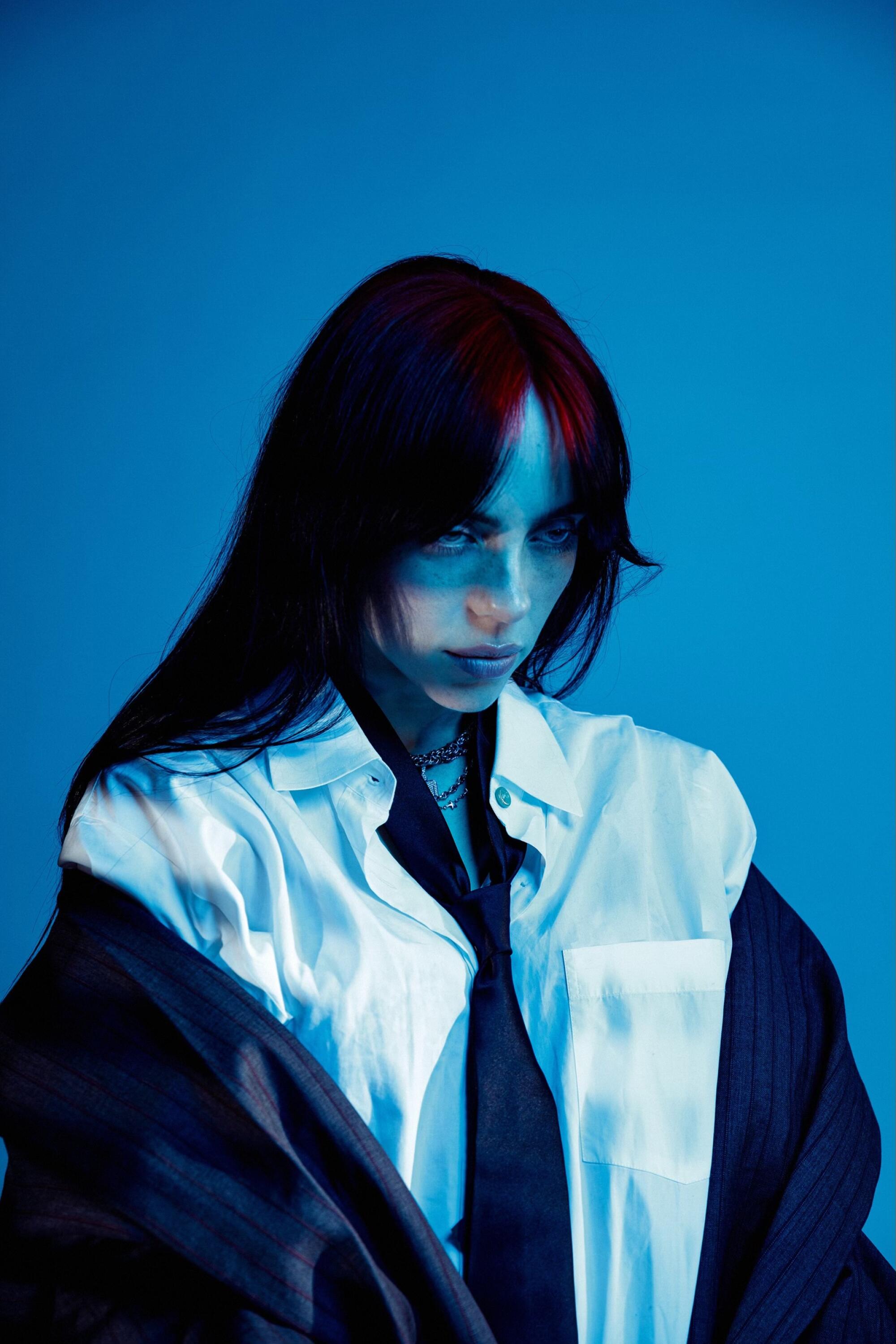
According to the singer, the hair began to feel like a costume in which she lost her identity. “I completely had no idea who I was,” she says. “I came up with this whole aesthetic, and I just got swallowed up into it.” She cut the blond hair short, which registered as an improvement, then she went brown for a spell, including a gig hosting “Saturday Night Live” two Christmases ago. “I look back at that and I’m like, ‘Who is this brunet?’” she says. “A brunet! That wasn’t me.” Finally going back to black restored her creative mojo to the point that she could funnel her thoughts of disappointment and futility into music — into a song inspired, as it happens, by one of culture’s most iconic blonds.
Eilish plays a voice memo from the night in January when she and her brother wrote “What Was I Made For?”; it sounds almost exactly like the finished recording. “I didn’t want it to become this big thing,” she says of the song. “It’s like a delicate butterfly wing, and I didn’t want to rip it.” Mark Ronson and Andrew Wyatt, who composed “Barbie’s” score and oversaw the movie’s soundtrack, added a romantic orchestral arrangement that evokes Nelson Riddle. But the focus remains on Eilish’s singing, which she admits took work to get just right.
Billie Eilish’s ‘What Was I Made For?’, co-written with her brother Finneas O’Connell, has transcended the smash-hit film it arrived with.
“It’s this very soft kind of back-of-my-head voice that’s very airy but also very enunciated,” she says. “Now that my voice has matured, I can play with it like an instrument, which is so cool. I can’t tell you how much I’m enjoying the f— out of that.”
Eilish, who recently weathered a high-profile breakup with singer Jesse Rutherford of the L.A. rock band the Neighbourhood, has been thinking a lot about maturity as she and O’Connell wrap up work on Eilish’s third LP. “It feels somehow very different from the rest of what I’ve ever put out,” she says. “Like, now I’m in my 20s — oh, my God, that’s so weird — and I’ve never been an adult putting music out before.” With her reentry on the horizon, I ask if she’s heard some of the big pop records that have defined 2023. SZA’s “SOS”? “Great — I love it,” she says. Olivia Rodrigo’s “Guts”? “Adorable.”
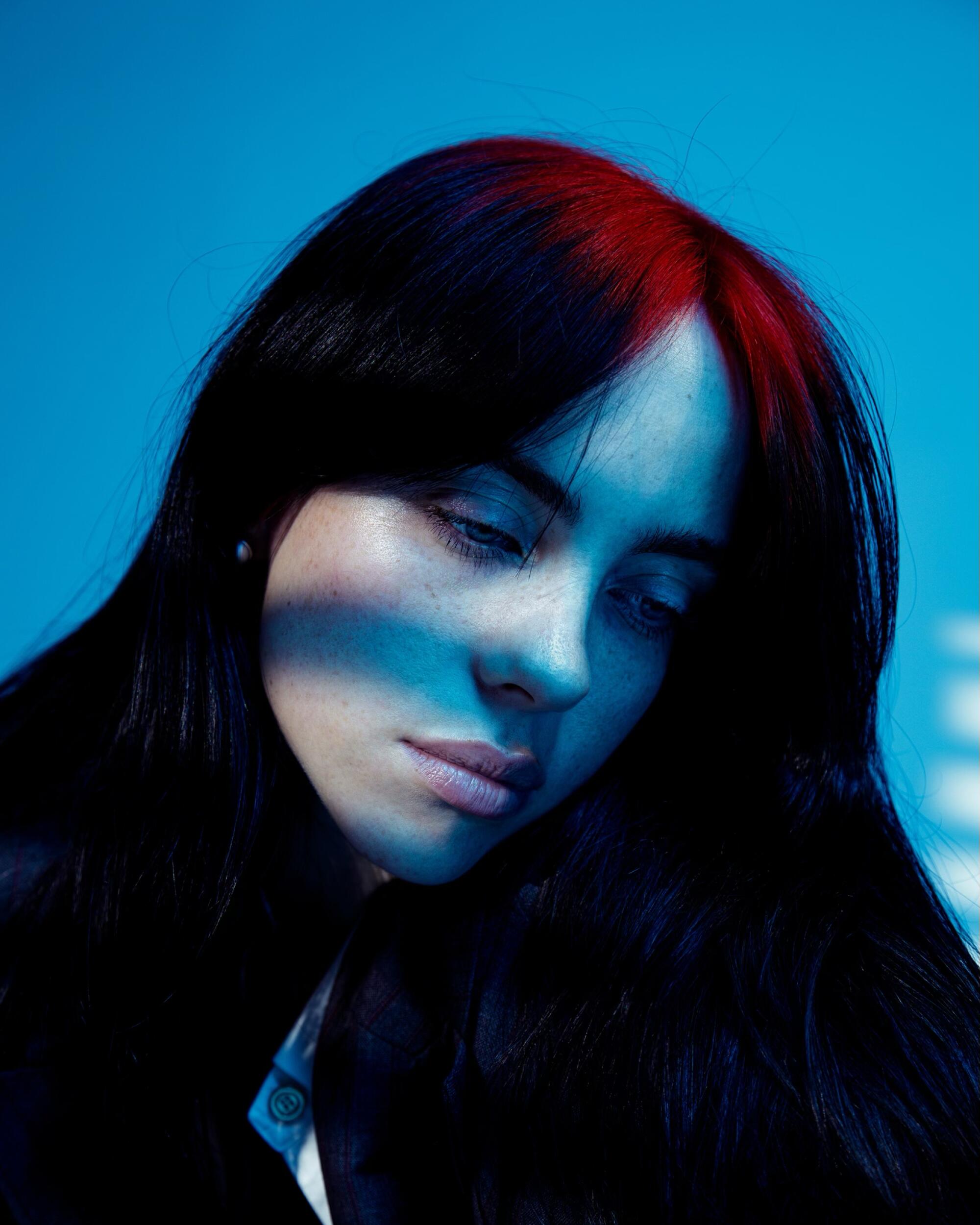
Does she feel a kinship with Rodrigo, who was born 14 months after Eilish and who similarly rocketed to pop stardom as a teenager with her monster 2021 ballad “Drivers License”? “I think everybody’s experiences are so individual,” she says. “Nobody has had anybody else’s life, you know? But I do feel a protectiveness over Olivia. I have a song called ‘Goldwing’ from my last album that’s kind of about her. I’ve never said that to anyone. It’s not only about her. I was just thinking about her when I was writing it. She was coming up, and she was younger than me, and nobody had ever been younger than me,” she adds with a laugh.
“Goldwing” opens with a few lines from a hymn that Eilish sang as a kid in the Los Angeles Children’s Chorus; later, she sketches a portrait of looming exploitation that Barbie might recognize:
They’re gonna tell you what you want to hear
Then they’re gonna disappear
Gonna claim you like a souvenir
Just to sell you in a year
“Olivia was getting big, and she was just, like, this little dainty child,” Eilish says of the performer who got her start in the Disney universe. “I felt so nervous. I was worried about her. She came up in that acting world, and people are so weird. I don’t know — I just felt very protective over her. And I feel that way to everyone.” She mentions Ariana Greenblatt, who plays a crucial role in “Barbie” as a moody middle-schooler. “She’s 16, and I literally want to cry about her sometimes,” she says.
“I just see myself in all these young girls. And it’s the girls, man. Boys can handle themselves. They’re dudes — they don’t have to deal with it like we do.” She sighs. “I just want to hold everybody in a little glass box and never let anything touch them.”
